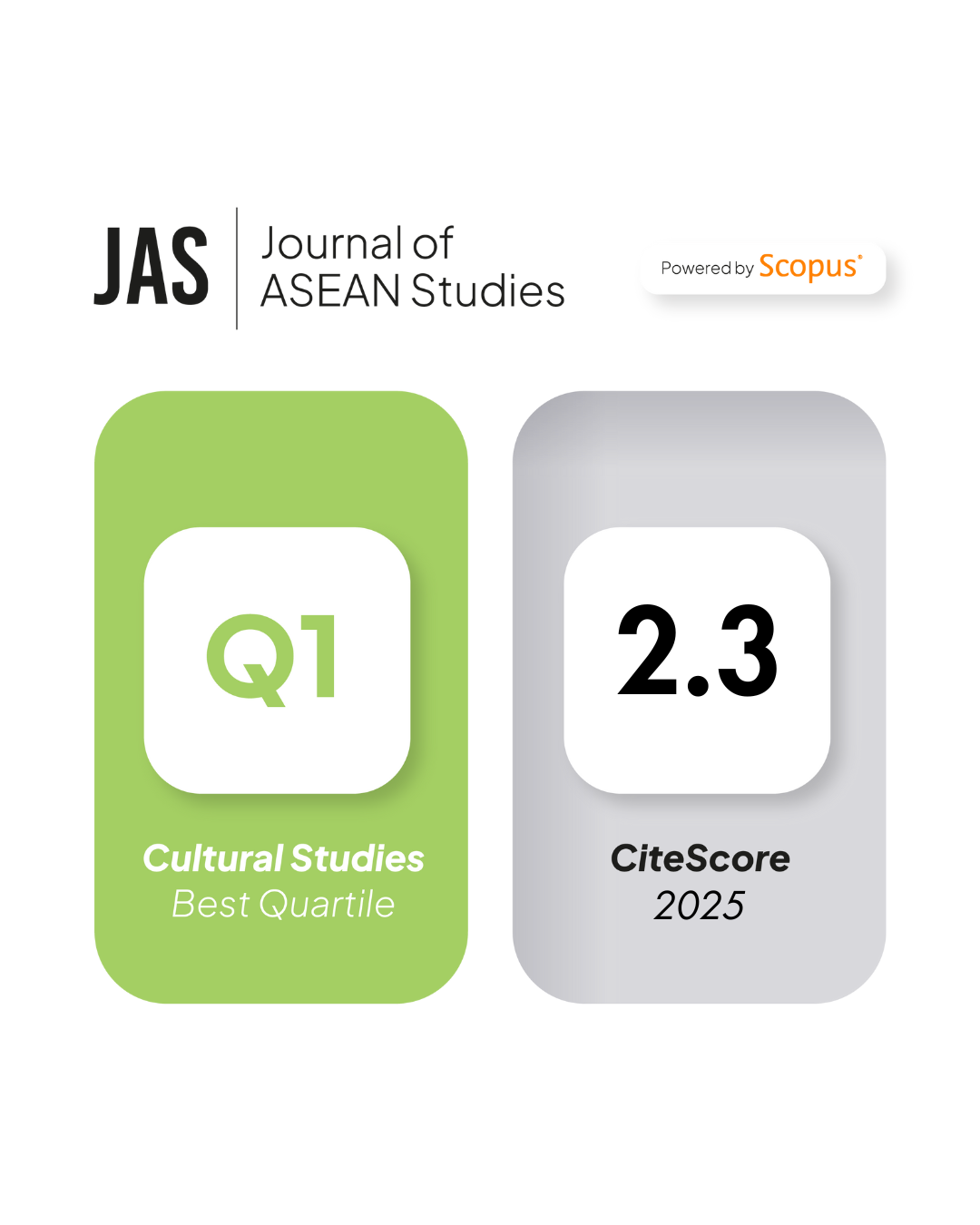Financing Peace: Special Autonomy Fund as a Peace Dividend in Aceh, Indonesia
DOI:
https://doi.org/10.21512/jas.v7i2.5787Keywords:
Southeast Asia Insurgencies, Peacebuilding, Aceh, Special Autonomy Fund, Economic Grievances, Peace DividendAbstract
This paper discusses the peacebuilding process in Aceh Indonesia. Southeast Asia is one of the regions that has been plagued by severe ethno-nationalist strives due to its high level of diversity and the impact of colonialism. Among several cases of ethno-nationalist struggles in this region, the separatist insurgency in Aceh, Indonesia has been regarded as the protracted conflict that has been successfully resolved and created durable peace. The Helsinki Peace Agreement attempted to redress the economic grievances that were manifested in perceived inequality and the exploitation of Aceh’s natural resources through the arrangement of Special Autonomy Fund. This fund serves as a peace dividend that is expected to bring welfare and enhance economic development in Aceh. The paper examines the role of Special Autonomy Fund in accelerating economic development in Aceh in the past ten years by utilizing the concept of the peace dividend and the model of fiscal-sharing. While this fund has been successfully increasing Aceh economic growth compared to the conflict era, it has not been optimally utilized to reduce poverty and inequality. Due to the nature of peace in Aceh as an elite-based peace, the peace dividend has contributed to the patronage politics particularly among the former combatants.
References
ACDP. (2014). Penelitian Kebijakan Pendidikan di Aceh [Research on Education Policy in Aceh]. Jakarta: ACDP.
AcehTrend. (2017, 5 May). Mengapa Aceh Miskin? (Why is Aceh Poor?). Retrieved from https://www.acehtrend.com/2017/05/08/mengapa-aceh-miskin/
Aleman, E. & Treisman, D. (2005). “Fiscal Politics and Ethnically Mined, Developing, Federal States: Central Strategy and Secessionist Violence”, In Roeder, P. and Rotchild. D (Eds) Sustainable Peace: Power and Democracy After Civil Wars, Ithaca: Cornell University Press.
Aspinall, E. (2009). Combatant to Contractors: The Political Economy
of Peace in Aceh. Indonesia. Indonesia, Volume 87 , 1-34.
Aspinall, E. (2014). Special autonomy, predatory peace and the resolution of the Aceh conflict. In H. Hill (Ed.), Regional Dynamics in a Decentralized Indonesia (pp. 460-481). ISEAS–Yusof Ishak Institute.
Bank Indonesia. (2009). Kajian Ekonomi Regional Provinsi Aceh Triwulan III 2009 [Regional Economic Analysis Third Trimester 2009]. Retrieved from https://www.bi.go.id/id/publikasi/kajian-ekonomi-regional/aceh/Pages/ker_aceh_0309.aspx
BAPPEDA. (2015). Kajian Pelaksanaan Dana Otonomi Khusus Aceh [Analysis of The Implementation of the Aceh Special Autonomy Fund]. Banda Aceh: BAPPEDA.
Barr, C., Resosudarno, I., Dermawan, A., McCarthy, J., Moeliniono, M., & Setiono. (2006). Summary and Recommendations'. In C. Barr, I. A. Resosudarmo, A. Dermawan, & J. McCarthy, Decentralization and Recentralization in Indonesia's Forestry Sector (pp. 122-133). Bogor, Indonesia: Center for International Forestry Research (CIFOR).
Barron, P., Rahmant E., & Nugroho K. (2013). The Contested Corner of Asia: Sub-National Conflict and International Development Assistance, The Case of Aceh, Indonesia. The Asia Foundation.
Cahyono, H. (2016). Evaluasi Atas Pelaksanaan Otonomi Khusus Aceh: Gagal Mensejahterakan Rakyat dan Sarat Konflik Internal (Evaluation of The Implementation of Aceh Special Autonomy: A Failure to Bring Welfare to People and Marred by Internal Conflict). LIPI. Retrieved from http://ejournal.politik.lipi.go.id/index.php/jpp/article/download/227/101
Chan, S. (1995). Grasping the Peace Dividend: Some Propositions on the Conversion of Swords into Plowshares, Mershon International Studies Review, Vol. 39, No. 1 pp. 53-95.
Collie. (2006). Economic Causes of Civil Conflict and their Implication for Policy. Oxford: Department of Economics. Oxford University. Retrieved from http://users.ox.ac.uk/~econpco/research/pdfs/EconomicCausesofCivilConflict-ImplicationsforPolicy.pdf
Crisis Management Initiatives. (2017). Peace has given Aceh a new lease of life. Retrieved from http://cmi.fi/2017/08/07/peace-given-aceh-new-lease-life/
Databoks,. (2017) Provinsi Mana Tingkat Kemiskinannya Tertinggi? (Which Province has the Highest Poverty Rate?). Retrieved from https://databoks.katadata.co.id/datapublish/2017/07/18/provinsi-mana-tingkat-kemiskinannya-tertinggi
Diela, T. (2018, July 5). Indonesia Arrest Ex-Revel Turn Governor in Aceh Over Graft. Reuters. Retrieved from https://www.reuters.com/article/us-indonesia-corruption/indonesia-arrests-ex-rebel-turned-governor-in-aceh-over-graft-idUSKBN1JV0LX
Djuli, M. N. (2018, February 22). Aceh Peace Process: Revisiting White Helsinki. The Jakarta Post. Retrieved from https://www.thejakartapost.com/academia/2018/02/22/aceh-peace-process-revisiting-white-helsinki.html
Haass, F., Ottmann, M. (2017) Profits from Peace: The Political Economy of Power Sharing and Corruption, World Development, Vol 99, pp 60-74.
Hillman, B. (2011). The policy-making dimension of post-conflict governance: the experience of Aceh, Indonesia, Conflict, Security & Development. Vol 1 No 5, pp 533 553.
Islahudin, (2010). Some Preliminary Notes on The Aceh Special Autonomy Fund and the Shared Oil and Gas Earning Fund. Helsinki: The Aceh Peace Process Follow Up Projects. Retrieved from http://www.acehpeaceprocess.net/pdf/islahuddin.pdf
International Recovery Platform, (2004) Indian Ocean Tsunami 2004. Retrieved from https://www.recoveryplatform.org/countries_and_disasters/disaster/15/indian_ocean_tsunami_2004
Jawa Post. (n.d). Transfer Besar, Kawalan Longgar (Big Transfer, Loose Monitoring System). Retrieved from http://jpip.or.id/artikelview-490-transfer-besar-kawalan-longgar.html
Marcelo, V. (2018, July 24). The Bangsamoro Organic Law: Everything you need to know. CNN Philippines. Retrieved from http://nine.cnnphilippines.com/news/2018/07/24/bangsamoro-organic-law-primer-everything-you-need-to-know-bbl.html
Medan Bisnis Daily. (2016, February 6). Ekonomi Aceh Tumbuh Negatif [The Negative Growth of Aceh Economy]. Retrieved from http://www.medanbisnisdaily.com/news/read/2016/02/06/214831/ekonomi-aceh-tumbuh-negatif/
O'Hearn,D (2000) Peace Dividend, Foreign
Investment, and Economic Regeneration: The Northern Irish Case, SOC. PROBS. Vol 47, pp 180-200
Onder , H., Cordella, T. (2016). Cash for Peace?: How Sharing Natural Resources RevenueCan Prevent Conflict. Washington DC: Brookings. Available online at https://www.brookings.edu/blog/future-development/2016/12/05/cash-for-peace-how-sharing-natural-resource-revenues-can-prevent-conflicts/
Putri, R. D. (2018, July 30). Foya-foya Dana Otsus Aceh Ala Eks GAM [Spending Free of Aceh Special Autonomy Fund by Former GAM]. Tirto. Retrieved from https://tirto.id/foya-foya-dana-otsus-aceh-ala-elite-eks-gam-cP9Z
Reilly, B., & Graham, K. (2004). Conflict through the Asia and Pacific: Causes and Trends. In A. Heijmans, N. Simmonds and H. Van De Veen. (Eds). Searching for Peace in Asia Pacific. Boulder: Lynne and Rienner Publisher.
Roeder, P. & Rotchild. D. (2005). “Nation- State Stewardship and The Alternative to Power Sharing”, In Roeder, P. and Rotchild. D (Eds) Sustainable Peace: Power and Democracy After Civil Wars, Ithaca: Cornell University Press.
Schulze, K. (2004). The Free Aceh Movement (GAM): Anatomy of a Separatist Organization, Washington DC : East West Center.
The World Bank. (2011). Aceh Public Expenditure Analysis: Spending for Reconstruction and Poverty Reduction. Jakarta: World Bank.
Transparency International. (2005). Global Corruption Report 2005: Special Focus Construction and Post-Conflict Reconstruction. London: Pluto Press.
Van Klinken, G. & Aspinall, E. (2011). Building Relations: Corruption, Competition and Cooperation in the Construction Industry. In Klinken and Aspinall (eds) The State and Illegality in Indonesia, pp 139-164, Leiden: KILTV.
Von Hehn, A. (2011). The Internal Implementation of Peace Agreement After Violent Intrastate Conflict: Guide for Internal Actors Responsible for Implementation, Leiden: Martinus Nijhoff Publishers.
Weller, M. (2005). The self-determination trap Ethnopolitics Vol 4 No 1, pp 3-28.


























